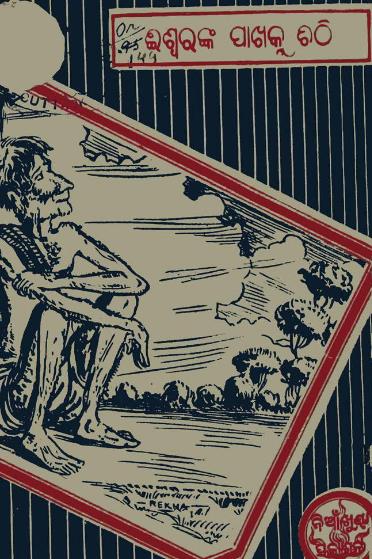Published in 1949, Ishwaranka Pakhaku Chithi (A Letter to God) by Godabarisha Mahapatra is a compelling narrative that intricately weaves themes of yearning, spirituality, and the human condition. This fascinating story unfolds through the lens of personal letters, providing a unique framework for exploring deep emotions and the relationships between individuals and the divine.
Ishwaranka Pakhaku Chithi tells the story of a devoted character who, feeling lost and desperate in the complexities of life, decides to write a heartfelt letter to God. This act of writing becomes a cathartic experience, revealing his innermost thoughts, desires, and grievances. Through this epistolary format, Mahapatra captures the essence of human vulnerability and the longing for connection with a higher power.
The protagonist grapples with various challenges—personal failures, existential questions, and the search for meaning in a world filled with turmoil. As he articulates his struggles and joys in the letter, readers are drawn into his emotional landscape, resonating with the universal themes of faith and hope that transcend cultural boundaries.
At the heart of Ishwaranka Pakhaku Chithi lies a profound exploration of faith. The protagonist’s letter reflects the innate human desire to communicate with the divine, seeking solace in times of adversity. This theme resonates deeply with readers, reminding us of our own moments of doubt and the yearning for answers from a higher power.
Mahapatra skillfully portrays the tension between faith and despair, illustrating how moments of crisis can lead to profound spiritual introspection. The protagonist’s journey is both personal and universal; it serves as a mirror for anyone who has ever felt abandoned or bewildered by life’s challenges. The act of writing to God symbolizes a quest for understanding and reassurance, a motif that resonates across different cultures and narratives.
Set against the backdrop of post-independence India, Ishwaranka Pakhaku Chithi also reflects the socio-political landscape of its time. The narrative subtly addresses the struggles faced by individuals in a rapidly changing society. Mahapatra’s poignant storytelling captures the essence of human experience amidst the broader themes of national identity and social transformation.
Through rich descriptions and cultural references, Mahapatra immerses readers in the fabric of Odia life, highlighting traditional values, spirituality, and the interconnectedness of community. The story offers a glimpse into the rituals and practices that define Odia culture, enriching the narrative with authenticity and depth.
The narrative style of Ishwaranka Pakhaku Chithi is notable for its lyrical quality and emotional resonance. Mahapatra’s prose is imbued with poetic elements, enhancing the emotional weight of the protagonist’s letter. The use of vivid imagery and sensory details draws readers into the character’s world, allowing them to experience his turmoil and aspirations intimately.
Moreover, the structure of the story mirrors the introspective nature of the letter, with each stanza unfolding layers of thought and feeling. This approach not only engages readers but also invites them to reflect on their own beliefs and experiences.
Books Info
| Books name | Ishwaranka Pakhaku Chithi / ଈଶ୍ବରଙ୍କ ପାଖକୁ ଚିଠି |
| Author | Godabarisha Mahapatra |
| No Of pages | 18 |
| Publisher | Sri Chandramani Mahapatra |
| Publication | 1949 |
| Printed At | The Satyabadi Press |
| Distributor | NA |

